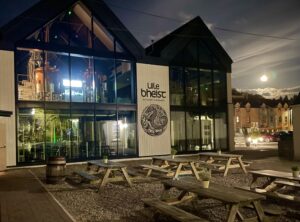Historic Burns’ Night debate underlines Scottish commitment to becoming a tech nation
Written By Russell Dalgleish, CEO, Scottish Business Network
On 25 January 2024, history was made when the Scottish Parliament held a Burns Night debate on Scotland as a technology nation. As any true Scot knows, Burns Night marks the birthdate of Robert Burns, our most famous poet. The day is marked by festivities across the country and, as is befitting of a man who helped codify what it means to be Scottish, is a chance to celebrate Scotland’s heritage.
But the night shouldn’t only be rooted in the past. As the parliamentary debate showed, it’s also a chance to celebrate ongoing Scottish achievements and the future the country is building for itself. That made the debate on Scotland as a technology nation particularly apt, as that is an area where significant advances are happening.
But it’s also critical that the government and private sector alike do everything they can to grow the country’s technological prowess. While that should include providing support wherever possible, it should also involve tapping into the extensive global Scottish diaspora.
Where Scotland’s winning at tech
To understand what that support should look like, it’s important to get a sense of where Scottish tech is thriving and how those wins can be expanded and built upon.
At present, the Scottish technology sector is most heavily concentrated in its three biggest cities: Glasgow, Edinburgh, and Aberdeen. And of those three cities, Edinburgh is home to the lion’s share of high-growth technology companies, with 38% headquartered in the capital. And while Scotland’s initial tech boom in the late 1990s and early 2000s was largely built on the arrival of semiconductor giants such as IBM and Honeywell in the country, things have evolved considerably since then. The country is home to several software startups that have millions of customers around the world, with Grandtheft Auto creator Rockstar North and travel comparison site Skyscanner among the most notable.
But other emerging technology fields are beginning to thrive too. The fintech sector, for instance, has seen its employment figures grow 24% in just two years. Another promising area of growth is healthtech, which saw record levels of funding in 2022 and is home to several of Scotland’s most promising technology startups, including Amphista Therapeutics, NuCana BioMed, and Roslin. Artificial intelligence (AI) could be another area of strength. Edinburgh’s long history in machine learning and AI in particular (Edinburgh University’s School of Informatics celebrated 60 years of research and development) positions the country well for the future in this regard.
It’s also clear that the Scottish government is increasingly supportive of the country’s technology sector, putting it at the forefront of its growth plans. Not only has it made investments directly into the space in partnership with the private, but it’s also put money into things like infrastructure and innovation hubs. Additionally, it launched a programme in 2022 aimed at increasing the pool of available tech talent by making Scotland an attractive employment destination.
Leveraging the diaspora
If Scotland is to achieve its technological ambitions, it also needs to tap into one of the best resources it has at its disposal: its diaspora. The true scale of the Scottish diaspora is unknown, but the Scottish government has estimated that upwards of 40 million people around the world, consider themselves to have Scottish ancestry. More than a million Scottish-born people are living around the world, many of whom have deep expertise in technology and the investments needed to make it thrive.
Those Scots are a vital conduit for bringing the world to Scotland and Scotland to the world. With their help, Scottish companies could more easily find overseas investment and launch into new markets. Additionally, that diaspora could help direct top talent into Scottish companies.
Scotland has a long history of innovation, with Scots helping develop some of history’s most important inventions. With the right support, today’s tech innovators could follow in their footsteps and change the world.
The recent Burns Night showed many members of the diaspora how serious the country is about becoming a technology nation. Now is the time to build on that momentum by using their expertise to help make that a reality.







